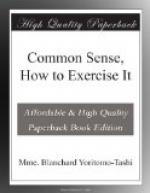“Deduction is the great support of mental weakness. It helps in discerning proportions, possibilities, even as it helps in skilfully avoiding the fear of error.”
We shall have occasion to speak more at length of deduction, for Yoritomo devotes many pages to it. We shall, then, defer to a future chapter the interesting developments that he discloses on this subject, and we shall continue to study the fan of common sense with him.
“Foresight,” he continues, “is rightly looked upon as one of the indispensable elements in cultivating common sense.
“The faculty of foresight always accompanies common sense, in order to strengthen its qualities of skill and observation.
“One must not confound, as many people are tempted to do, foresight and conjecture.
“The first consists in taking great care to prevent the repetition of unhappy facts which have already existed.
“Foresight will exert an influence on future events by establishing an analogy between them and the actual incidents which, of necessity, will lead to the adoption or rejection of present projects.
“It is to be observed that all these faculties are subordinate, one to the other, and, in proportion to the unfolding of the fan, we can prove that all the blades previously mentioned have concurred in the formation of the blade of which we are now speaking.
“In order to foresee disasters it is necessary that the perception—visual or auditory—of said disasters should already have imprest us.
“We have kept intact the memory of them, since it is reconstructed emotion which guides our thoughts.
“These same thoughts, in extending themselves, form groups of thoughts harmonious in character, all relative to the one, which is the object of the debate.
“Our mind becomes more active in recalling the incidents, the remembrance of which marks the time which has elapsed between the old perception and the present state of mental absorption.
“The faculty of deduction, which is born of these different mental conflicts, permits me to foresee that circumstances of the same nature will lead to others similar to those we have already mentioned.
“We have merely sketched rapidly the scale of sensations which follow each other, in order to reach the explanation of how foresight is formed, this faculty of which we are now speaking.
“By assimilating these present facts with those of the past, we are permitted to draw a conclusion, relating to the same group of results, because of the conformity of those past facts to the present questions.
“Foresight is passive; between it and precaution there is the same difference as between theory and practise.
“Precaution is preeminently active, and it marks its first appearance by means of foresight, but does not stop in this effort until it has rendered foresight productive.
“It is well to foresee, but it is precious to preclude.




